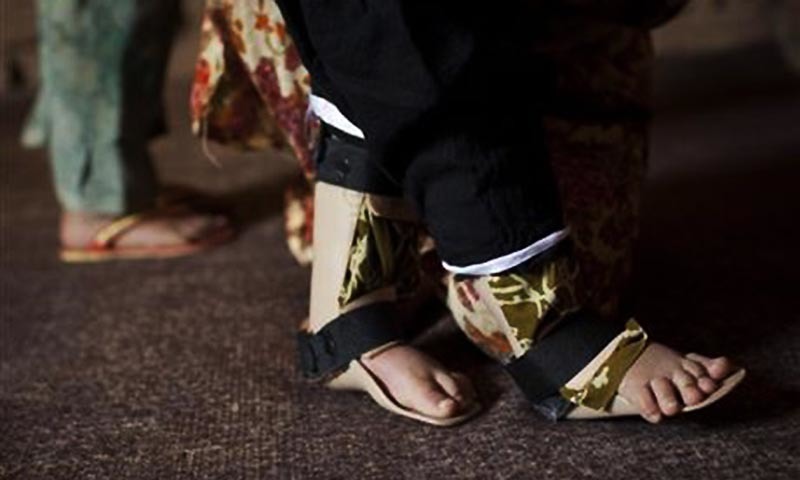ISLAMABAD: Clearly frustrated by the increasing number of polio cases gestating in and being exported from the country and the lack of zeal at the federal level to fight the polio virus, the International Health Regulations (IHR) Committee of the World Health Organisation (WHO) has warned Pakistan that its citizens will be subjected to global screening if the country does not improve its performance drastically over the next six months.
But healthcare authorities in Pakistan seem to be in denial regarding the ultimatum issued by the third IHR Emergency Committee meeting, held from Nov 2 to Nov 7.
Read| Pakistan responsible for 80pc polio cases: WHO
Minister for National Health Services (NHS) Saira Afzal Tarar said in a statement on Saturday that no new travel regulations were being imposed on Pakistanis, thanks to the government’s “all-out efforts” to stop the spread of polio.
The IHR has consistently shown concerns over Pakistan’s status as a major exporter of the poliovirus. It noted that the global spread of wild poliovirus has continued after July 31, with at least three new exportations from Pakistan into neighbouring Afghanistan.
There has been no other documented instance of the wild poliovirus being transmitted across borders since March 2014.
An official statement issued by WHO says that the risk of the virus spreading from Pakistan was assessed to have increased substantively since July 31, as cases had escalated during the current high transmission season and there has been no significant improvement in the underlying factors that are driving transmission within the country.
IHR emergency meeting issues Pakistan-specific instructions; asks govt for regular progress reports
“The risk of new international spread from the other nine currently infected states appears to have declined, with only two of those states having reported new cases since July 31: Somalia (1 case) and Afghanistan (7 cases, most of which were due to imported virus),” says the statement.
Also read: No deadline given for polio eradication, says PM House
Pakistan, Cameroon, Equatorial Guinea and the Syrian Arab Republic have been recommended to officially declare poliovirus transmission ‘a national public health emergency’ at the level of head of state or government. The countries have also been asked to ensure that all residents and long-term visitors receive a dose of oral polio vaccine (OPV) or inactivated poliovirus vaccine (IPV) between four weeks and 12 months prior to international travel.
Pakistan-specific advice
Recognising the problems with the spread of the wild poliovirus in Pakistan, the committee provided additional advice to the WHO director-general for consideration to reduce further the risk of international spread of wild poliovirus.
IHR has recommended that Pakistan should restrict, at the point of departure, the international travel of any resident lacking documentation of appropriate polio vaccination. These recommendations apply to those travelling by road, air or sea.
Those undertaking urgent travel and have not received appropriate vaccination, must receive a dose of polio vaccine at least by the time of departure and be provided with appropriate documentation of that dose.
Pakistan has also been asked to provide to the WHO director-general a monthly report on implementation of the temporary recommendations on international travel, including the number of residents whose travel was restricted and the number of travellers who were vaccinated and provided appropriate documentation at the point of departure.
Pakistan has been warned that if the existing and additional recommendations for the vaccination of travellers cannot be fully implemented by the time the committee meets next, it will consider additional measures, such as screening-on-entry to reduce the risk of international spread.
NHS in denial
In a statement issued in response to the latest IHR meeting, the health minister said that no new travel restrictions had been imposed, thanks to the “all-out efforts of the government to stop the spread of polio”.
“All passengers are being vaccinated by the provincial governments at designated hospitals and points of entry for emergency travellers. WHO has asked for data, which is being provided,” she said, making no mention of the other steps proposed by the IMB or their concerns over the continued export of the wild poliovirus from Pakistan.
An official from the NHS ministry told Dawn that the IHR has been busy with the Ebola outbreak lately, which was why Pakistan merely got off with a warning this time. The international screening stipulation means that Pakistani travellers’ polio certificates will have to be checked at the time of entry into other countries. Currently, certificates of vaccination are only a local requirement.
“Unfortunately, the government takes these recommendations very lightly, obvious from the fact that they have not implemented the recent IMB recommendation asking for the polio programme to be handed over to the National Disaster Management Authority,” he said, attributing these fresh warnings to Pakistan’s non-compliance with IMB’s recommendations.
Shahnaz Wazir Ali, technical coordinator at the Sindh polio cell told Dawn that the polio emergency was declared in Pakistan nearly two-and-half-years ago.
“Interim prime minister Mir Hazar Khan Khoso, however, decided to shut down the polio programme. The setback that caused has yet to be rectified. Moreover, Prime Minister Nawaz Sharif waited many months before appointing Ayesha Raza Farooq as his focal person. She is doing a good job,” she said.
“The health minister tries to deal with the polio issue but she many other things to do as well and polio requires full time attention. It is a positive sign that the PM has held a meeting regarding polio and has been taking steps for polio eradication but he should have started a year ago,” she said.
Published in Dawn, November 16th , 2014













































